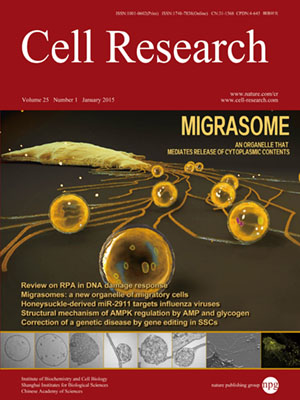
Volume 25, No 1, Jan 2015
ISSN: 1001-0602
EISSN: 1748-7838 2018
impact factor 17.848*
(Clarivate Analytics, 2019)
Volume 25 Issue 1, January 2015: 135-138
LETTERS TO THE EDITOR
EGF promotes mammalian cell growth by suppressing cellular senescence
Peter B Alexander1, Lifeng Yuan1, Pengyuan Yang1, Tao Sun1, Rui Chen1, Handan Xiang1, Jiekai Chen2, Haoyu Wu2, Daniel R Radiloff3 and Xiao-Fan Wang1
1Department of Pharmacology and Cancer Biology, Duke University Medical Center, Durham, NC 27710, USA2Guangzhou Institutes of Biomedicine and Health, Chinese Academy of Sciences, Guangzhou, Guangdong 510530, China3Department of Pediatrics, University of British Columbia, Vancouver, V6T 1Z4, Canada
Correspondence: Xiao-Fan Wang,(xiao.fan.wang@duke.edu)
Cellular senescence is a state of irreversible proliferative arrest that is believed to be an important determinant of both cancer development and organismal aging1. Although numerous molecules have been found to promote senescence, little is known about the nature of anti-senescent factors under physiological conditions. To identify factors that may control the cellular senescent process, we cultured human mammary epithelial (HME) or human bronchial epithelial (HBE) cells in either complete growth medium, or medium formulated to lack individual hormones, growth factors, and other supplements commonly used in primary cell culture. Whereas most culture conditions had no noticeable effect on cell growth, one-week incubation in medium deprived of epidermal growth factor (EGF) resulted in cells displaying an enlarged, flattened morphology with obvious growth suppression.
10.1038/cr.2014.141
FULL TEXT | PDF
Browse 2132


